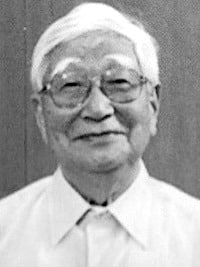Tomisaku Kawasaki
Tomisaku Kawasaki 川崎 富作 (1925-2020) was a Japanese pediatrician.
Japanese pediatrician famous for the discovery and ongoing research into Kawasaki Disease, which is now the commonest cause of acquired heart disease among children in several countries.
Kawasaki’s initial presentations met with opposition from his academic peers who thought that what he was describing was nothing other than ‘Still’s disease’ or ‘Stevens-Johnson syndrome’. However, Dr. Kawasaki had the courage of conviction to stand by his initial observations and he was convinced that this was indeed a new disease entity
Biography
- Born 7 February 1925 in Asakusa, Tokyo.
- 1948 – Graduated medicine from Chiba University Medical School
- 1950 – Pediatric training at the Japanese Red Cross Central Hospital in Hiroo, Tokyo (now Japanese Red Cross Medical Center)
- 1957 – MD, doctorate in medicine
- 1961 – Encountered the first case of Kawasaki disease.
- 1973 – Director of Pediatrics, Japanese Red Cross Central Hospital
- 1990 – Founder and Director of the Japan Kawasaki Disease Research Center
- Awards: Bering Kitasato Award (1986); Takeda Medical Award (1987); Health Culture Award (1987); Japan Medical Association Medical Award (1988); Asahi Prize (1989); Japan Academy Award (1991); Tokyo Cultural Award (1996); First recipient of the Japan Pediatric Society Award (2006)
- 2010 – 東京都名誉都民 Honorary Citizen, Tokyo
- Died June 5 2020
Medical Eponyms
Kawasaki disease (1967)
Kawasaki disease (KD) is an acute self-limited febrile multisystem vasculitis of childhood of unknown aetiology in which coronary artery aneurysms (CAA) may develop in 15% – 25% of untreated cases.
January 5, 1961 Tomisaku Kawasaki examined a 4 year-3 month old boy, with curious clinical symptom-complex.
The patient showed high fever of about two weeks duration, bilateral conjunctival hyperemia without discharge, reddening dry fissured lips, diffuse redness of the mucous membrane of oral cavity, strawberry-like tongue, left nonpurulent cervical adenopathy, polymorphous erythema on the body and marked redness of palms and soles with indurative edema of hands and feet following desquamation from the fingertips.
Kawasaki 1962
In 1967 Kawasaki presented 50 paediatric cases he had observed over a 6 year period with characteristic differences to syndromes grouped together at that time involving skin, mucous membranes and eyes.
…I have observed 50 cases similar to so-called mucocutaneous-ocular syndrome (MCOS) but different in various points, during approximately 6 years from January 1961 to November 1966…after more precise examination of the conventional reports about MCOS, I realized that our syndrome is a unique clinical entity, which is not identical with any type of MCOS ever reported. Therefore I present the clinical analysis and laboratory data of 50 cases we experienced as well as a review of the literature, and I hope to hear your opinion.
Kawasaki 1967
Major Publications
- Kawasaki T. Non-scarlet fever desquamation syndrome [in Japanese]. Chiba Med J 1962; 38: 279.
- Kawasaki T. [Acute febrile mucocutaneous syndrome with lymphoid involvement with specific desquamation of the fingers and toes in children]. Arerugi. 1967 Mar;16(3):178-222.
- Kawasaki T. [Acute Febrile Mucocutaneous Lymph Node Syndrome and Sudden Death] Nihon Shonika Gakkai Zasshi. 1971;75(6):433‐434.
- Kawasaki T, Kosaki F, Okawa S, Shigematsu I, Yanagawa H. A new infantile acute febrile mucocutaneous lymph node syndrome (MLNS) prevailing in Japan. Pediatrics. 1974 Sep;54(3):271-6. [First English publication]
- Kawasaki T. Kawasaki disease. Proc Jpn Acad Ser B Phys Biol Sci. 2006;82(2):59‐71.
References
- Burns JC. Commentary: translation of Dr. Tomisaku Kawasaki’s original report of fifty patients in 1967. Pediatr Infect Dis J. 2002; 21(11): 993-5.
- Singh S, Jindal AK. Fifty Years of Kawasaki Disease – A Tribute to Dr Tomisaku Kawasaki. Indian Pediatr. 2017; 54(12): 1037-1039.
- Kato H. Professor Tomisaku Kawasaki, my teacher and a friend: a tribute. Int J Rheum Dis. 2018;21(1):10‐12.
- Bibliography. Tomisaku Kawasaki. World Cat Identities


